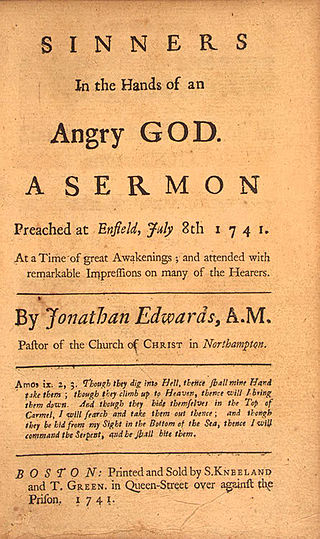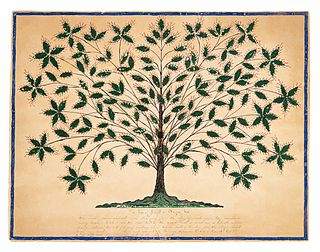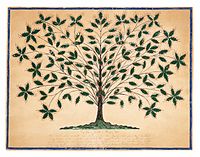
George Fox was an English Dissenter, who was a founder of the Religious Society of Friends, commonly known as the Quakers or Friends. The son of a Leicestershire weaver, he lived in times of social upheaval and war. He rebelled against the religious and political authorities by proposing an unusual, uncompromising approach to the Christian faith. He travelled throughout Britain as a dissenting preacher, performed hundreds of healings, and was often persecuted by the disapproving authorities.

The United Society of Believers in Christ's Second Appearing, more commonly known as the Shakers, are a millenarian restorationist Christian sect founded c. 1747 in England and then organized in the United States in the 1780s. They were initially known as "Shaking Quakers" because of their ecstatic behavior during worship services.

Ann Lee, commonly known as Mother Ann Lee, was the founding leader of the Shakers, later changed to United Society of Believers in Christ's Second Appearing following her death. She was born during a time of the Evangelical revival in England, and became a figure that greatly influenced religion at this time, especially in the Americas.

Inward light, Light of God, Light of Christ, Christ within, That of God, Spirit of God within us, Light within, and inner light are related phrases commonly used within the Religious Society of Friends (Quakers) as metaphors for Christ's light shining on or in them. It was propagated by the founder of the Quaker movement, George Fox, who "preached faith in and reliance on 'inward light' ". The first Quakers were known to sit in silence and meditate on the words of the Bible until they felt the inward light of God shining upon them and the Holy Spirit speaking. The concept was highly important to early Quakers, who taught: "God reveals Himself within each individual's conscience and consciousness by the Holy Spirit, Christ Himself being the Light to illuminate man's sinfulness and lead in the way of truth and righteousness. ... this light is in all men by the grace of God to lead them to Christ, and that the same light will give daily guidance to the Christian."

The Public Universal Friend was an American preacher born in Cumberland, Rhode Island, to Quaker parents. After suffering a severe illness in 1776, the Friend claimed to have died and been reanimated as a genderless evangelist named the Public Universal Friend, and afterward shunned both their birth name and gendered pronouns. In androgynous clothes, the Friend preached throughout the northeastern United States, attracting many followers who became the Society of Universal Friends.

Mary Dyer was an English and colonial American Puritan-turned-Quaker who was hanged in Boston, Massachusetts Bay Colony, for repeatedly defying a Puritan law banning Quakers from the colony. She is one of the four executed Quakers known as the Boston martyrs.

Pleasant Hill, Kentucky, USA, is the site of a Shaker religious community that was active from 1805 to 1910. Following a preservationist effort that began in 1961, the site, now a National Historic Landmark, has become a popular tourist destination.

The First Great Awakening or the Evangelical Revival was a series of Christian revivals that swept Britain and its thirteen North American colonies in the 1730s and 1740s. The revival movement permanently affected Protestantism as adherents strove to renew individual piety and religious devotion. The Great Awakening marked the emergence of Anglo-American evangelicalism as a trans-denominational movement within the Protestant churches. In the United States, the term Great Awakening is most often used, while in the United Kingdom, the movement is referred to as the Evangelical Revival.

A testimony of equality is an act, usage, or course of conduct by a member of the Religious Society of Friends (Quakers) tending to assert or promote equality of persons, arising from the Friends' belief that all people are equal in the eyes of God. The word testimony describes the way that Friends testify or bear witness to their beliefs in their everyday life. A testimony is therefore not a belief, but is committed action arising out of Friends' religious experience. Testimony of equality has included Quakers' participating in actions that promote the equality of the sexes and races, as well as other classifications of people.
Anti-Shakerism refers to negative attitudes concerning the Shakers. At their peak in popularity in the first half of the 19th century in the United States, the Shakers had approximately 4,000 to 6,000 members. As of 2021, the Shakers currently have at least three active members; few to no extant religious or ethnic groups have fewer members than the Shakers.

Quakers are people who belong to the Religious Society of Friends, a historically Protestant Christian set of denominations. Members of these movements are generally united by a belief in each human's ability to experience the light within or "answering that of God in every one". Some profess a priesthood of all believers inspired by the First Epistle of Peter. They include those with evangelical, holiness, liberal, and traditional Quaker understandings of Christianity. There are also Nontheist Quakers, whose spiritual practice does not rely on the existence of God. To differing extents, the Friends avoid creeds and hierarchical structures. In 2017, there were an estimated 377,557 adult Quakers, 49% of them in Africa.
Outward holiness, or external holiness, is a Wesleyan–Arminian doctrine emphasizing modest dress and sober speech. It is a testimony of a Christian believer's regeneration, done in obedience to God. The doctrine is prevalent among denominations emerging during the revival movements, including the Methodists, as well as Pentecostals. It is taken from 1 Peter 1:15: "He which hath called you is Holy, so be ye holy in all manner of conversation."
Jane Lead was a Christian mystic born in Norfolk, England, whose spiritual visions, recorded in a series of publications, were central in the founding and philosophy of the Philadelphian Society in London at the time.
William Dewsbury was an English Quaker minister and religious writer in the early period of the movement. He was born in Allerthorpe, Yorkshire, around 1621. Little is known of his parents or education, except that his father died when he was eight years old.

Lucy Wright was the leader of the United Society of Believers in Christ’s Second Appearing, also known as the Shakers, from 1796 until 1821. At that time, a woman's leadership of a religious sect was a radical departure from Protestant Christianity.

The Quakers have had a presence in Canada since 1670, when Charles Bayly was sent to be the governor of the Hudson's Bay Company. Early Quaker settlements were attempted in New Brunswick, Nova Scotia, Prince Edward Island and at Farnham in Quebec in the late 1700s. Permanent communities were realised at Adolphustown on the Bay of Quinte and at the same time at Pelham in the Niagara District before 1800. Quakers immigrated to Canada from New York, the New England States, and Pennsylvania.

The chronology of Shakers is a list of important events pertaining to the history of the Shakers, a denomination of Christianity. Millenarians who believe that their founder, Ann Lee, experienced the Second Coming of Jesus Christ, the Shakers practice celibacy, confession of sin, communalism, ecstatic worship, pacifism, and egalitarianism. This spans the emergence of denomination in the mid-18th century, the emigration of the Shakers to New York on the eve of the American Revolution, subsequent missionary work and the establishment of nineteen major planned communities, and the continued persistence of the faith through decline into the 21st century.
Job Bishop was an American early Shaker leader. A missionary, he founded the Shaker communities of Canterbury, New Hampshire, and Enfield, New Hampshire.
Mary Forster was an English Quaker campaigner. She wrote a preface to the 1671 edition of Guide to the Blind, which had been written by her husband, Thomas Forster.
Theophila Townsend was a Quaker writer, preacher, and activist from Cirencester, Gloucestershire, England.











